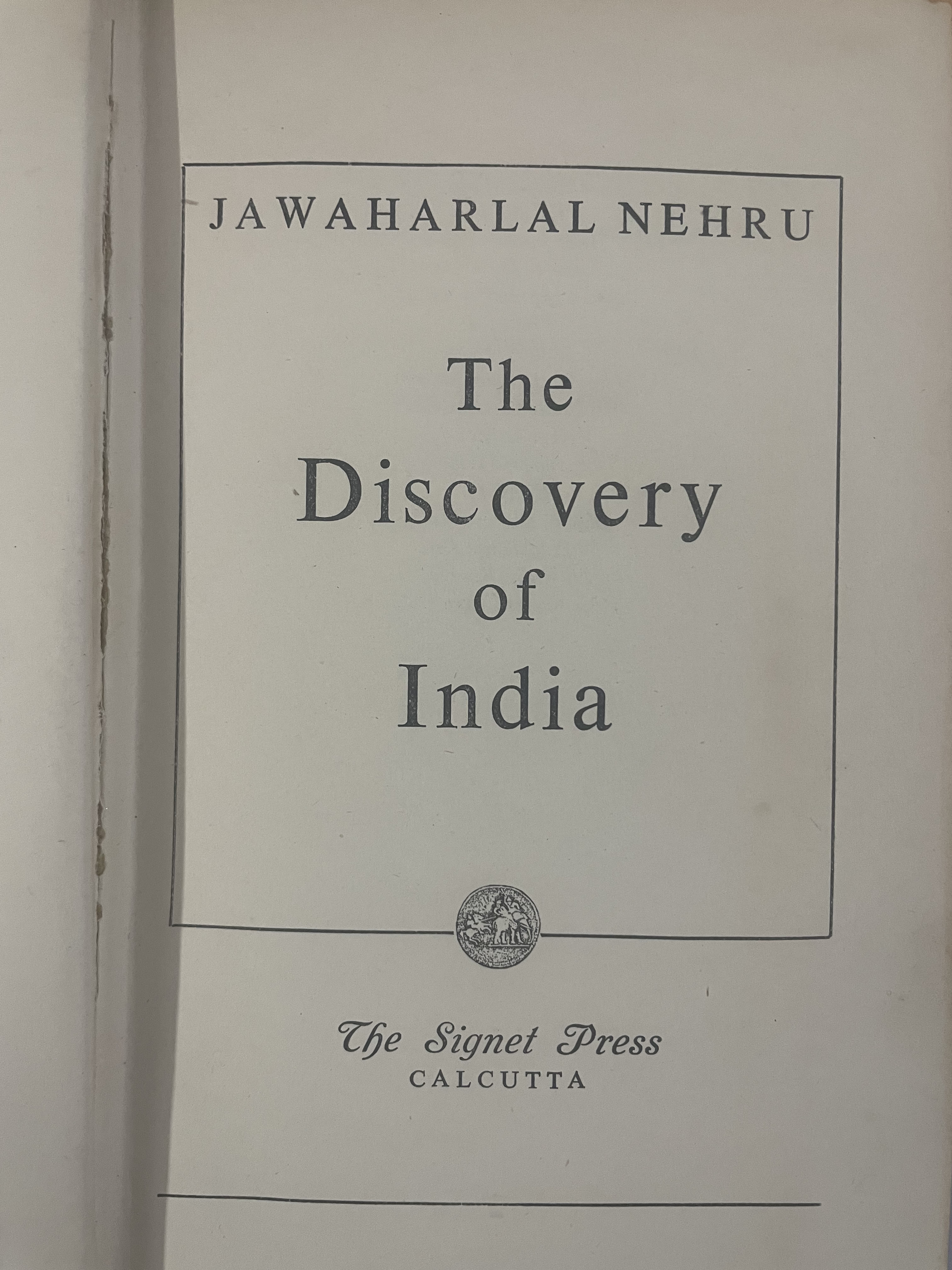The Discovery of India

About
Summary
Exquisite
TOC
Details
Related
URL
Images
Overview
The Discovery of India, penned by Jawaharlal Nehru during his imprisonment from 1942 to 1945, is a comprehensive exploration of India's history, philosophy, and culture, viewed through the eyes of a leader fighting for his country's independence. Written in 1944 and published in 1946, the book journeys from ancient civilizations to the British Raj, reflecting Nehru's vision of India's past, present, and future.The Discovery of India is a wide-ranging treatise that delves into the history, philosophy, art, religion, science, economy, society, and movements of one of the world's oldest civilizations. Nehru's work reinterprets key Indian writings, including the Vedas, Upanishads, and epics like the Ramayana and Mahabharata, to explore the origins of his nation. The book also recognizes the contributions of notable Indian figures such as Buddha, Chanakya, and Mahatma Gandhi. Nehru's writing combines historical analysis with personal insights, offering a unique perspective on India's identity and development.
Importance of Book
The Discovery of India is significant for its comprehensive exploration of India's historical and cultural roots, offering insights into the complexities of Indian society and its journey towards independence. The book sheds light on Nehru's vision for a modern, secular, and democratic India, influencing the country's post-independence policies and development.
Key Themes
Historical Analysis Nehru presents a detailed account of Indian history, starting from the Indus Valley Civilization and moving through the Vedic period, the Mauryan Empire, the Gupta period, and the medieval era, up to the advent of British rule. He analyzes the political, economic, and social structures of each period, highlighting the key developments and transformations.
Cultural Synthesis The book emphasizes India's ability to assimilate and synthesize diverse cultural influences. Nehru discusses how various foreign invasions and cultural interactions have enriched Indian culture, leading to a unique blend of traditions, religions, and philosophies.
Nationalism and Identity The Discovery of India explores the concept of Indian nationalism and the search for a distinct Indian identity. Nehru delves into the historical and cultural roots of Indianness, emphasizing the importance of unity in diversity and the need for a secular, inclusive national identity.
Critique of Colonialism Nehru critiques the economic, political, and cultural impact of British colonialism on India. He discusses the exploitation of India's resources, the suppression of indigenous industries, and the imposition of foreign cultural values, while also acknowledging the introduction of modern ideas and institutions.
Vision for the Future Nehru outlines his vision for a modern, independent India based on democracy, socialism, and secularism. He emphasizes the importance of economic planning, social justice, and scientific progress in building a strong and prosperous nation.
Cultural Significance
Understanding India's Heritage: The book provides a detailed account of India's ancient history, philosophy, and cultural traditions, fostering a sense of pride and appreciation for the country's rich heritage.
Promoting Cultural Unity: Nehru's emphasis on India's composite culture and its ability to assimilate diverse influences promotes a sense of unity and inclusivity, encouraging people from different backgrounds to coexist peacefully.
Inspiring National Identity: The book played a crucial role in shaping the post-independence Indian identity by highlighting the shared historical and cultural experiences of the Indian people.
Influencing Intellectual Discourse: The Discovery of India has had a lasting impact on Indian intellectual discourse, influencing the fields of history, sociology, and political science. It has inspired generations of scholars and writers to explore and interpret India's past and present.
Effects on Society
Shaping National Consciousness: The book contributed significantly to shaping the national consciousness of post-independence India, instilling a sense of pride in the country's heritage and promoting a shared national identity.
Guiding Policy Making: Nehru's vision for a modern, secular, and democratic India, as articulated in The Discovery of India, influenced the country's policy-making in areas such as economic planning, social justice, and international relations.
Promoting Education and Awareness: The book has been widely used as a textbook and reference material in Indian educational institutions, promoting awareness about Indian history, culture, and society among students and the general public.
Encouraging Social Reform: Nehru's critique of social evils and his advocacy for equality and social justice inspired various social reform movements in India, aimed at eradicating caste discrimination, promoting women's empowerment, and protecting the rights of marginalized communities
Conclusion
Nehru's The Discovery of India remains a seminal work, offering a profound and insightful exploration of India's past, present, and future, and continuing to shape the country's intellectual and cultural landscape.
Table of Content
\"The Discovery of India\" by Jawaharlal Nehru, published in 1946, typically includes a detailed exploration of Indian history, culture, and philosophy. While I can\'t provide the exact table of contents, it generally covers:Introduction to India\'s HeritageOverview of Indian civilization and its evolution.
Ancient IndiaEarly history, Vedic period, and the rise of empires.
Medieval IndiaThe impact of Islamic invasions and the Mughal Empire.
Colonial IndiaBritish rule and the socio-political changes during the colonial period.
Struggle for IndependenceThe Indian independence movement and key figures.
India\'s FutureNehru\'s vision for post-independence India.
Title
The Discovery of India
Author
Jawahar lal Nehru
Name of Publisher
The Signet press Calcutta
Publish Date
1946
Subject
A library or digital archive
Vintage
1901-1947
Edition
First
Category
Biography
Sub Category
Nehru
Rarity
RARE
